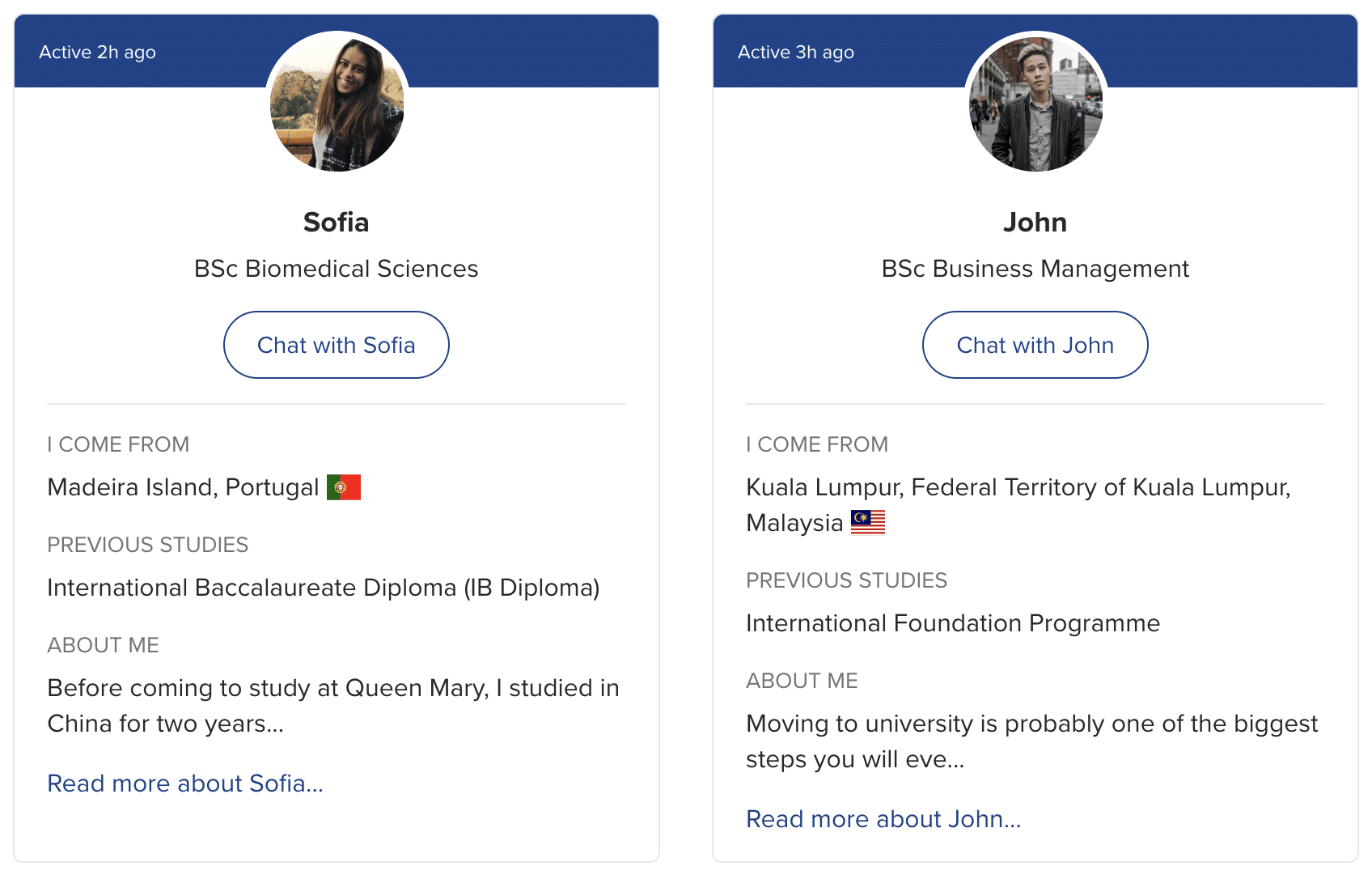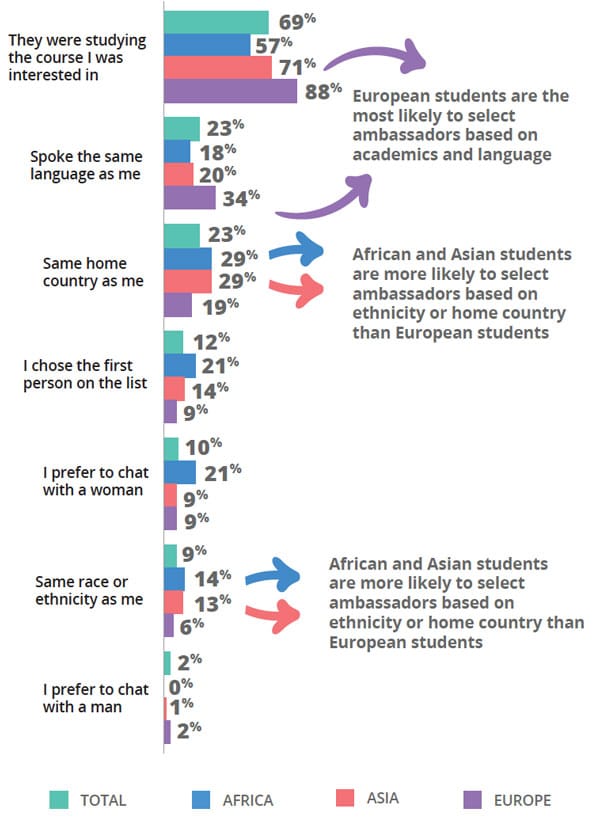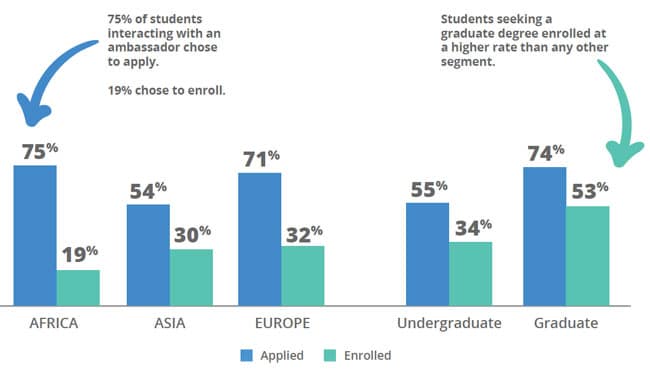The peer-to-peer effect in international student recruitment
A new study by Intead and Unibuddy – a platform that more than 200 universities around the world are using to enable peer-to-peer interactions – reveals that prospective students increasingly find student ambassadors to be an influential resource in their decision-making about study abroad. The study, entitled “Peer-to-Peer Student Conversations,” also reveals when in the recruitment funnel student ambassadors are the most impactful as well as how graduate students differ from undergrads in how they use this resource.
The report’s findings are based on a spring 2019 survey of international students who were accessed through 40 universities in the US and UK, as well as data drawn from 370,000+ peer-to-peer conversations within the Unibuddy platform. These conversations were between student ambassadors (that is, students already enrolled at a given university) and prospective students from over 217 different countries and territories.
Commenting on the study, Unibuddy CEO Diego Fanara said,
“Student-to-student connection has taken over as the most influential and helpful factor when deciding where to apply to university … even more influential than friends and family. This is a huge shift for universities and colleges. Students are the heart and soul of institutions so it's no surprise that prospective students value the authenticity of their experience above all else.”
Part of an overall effort
The study found that student ambassadors have the most impact once students are already exploring the possibility of going to a university, and particularly during application and enrolment processes. “Peer-to-peer interactions do not work as an attraction tool but rather as a resource that students use to deepen their knowledge of institutions they are already aware of,” notes the report.
Influential ambassadors
More than half (57%) of surveyed students said that online conversations with student ambassadors were the most helpful resource for them when they were considering which university to apply to, compared with 47% who said friends and family were the most helpful. In particular, notes the report, students appreciate ambassadors’ “unique and honest perspectives on academics, student life and local culture.”
The report quoted one respondent as saying, “The admission representatives give honest information as well most of the time but the students provide a more realistic day-to-day life perspective. They know more about the practical issues.”
The quote highlights the essential advantage that student ambassadors can give to recruitment efforts: ambassadors – because they have direct, current experience of being students – understand what matters to other students. They speak the same “language” – the language of their generation and that generation’s priorities – and they know what can make or break a study abroad experience.

Interactions vary by region
Students from Africa and Europe, as well as undergraduate students, were the most likely to find student ambassadors to be even more helpful than family and friends.
The survey asked students what kind of information they most valued from student ambassadors. This is the list – in order of which was determined most helpful to the most students surveyed: academic information, general information, student life and campus culture information, application and procedures, unique student perspective, general helpful resource, personal encouragement, sense of belonging, clarity to specific questions, good general advice.
However, there were variances. In Asia and Europe, information on academics was considered the most helpful, while African students valued the personal encouragement that student ambassadors provide.
Graduate students are more specific
Undergraduate students appreciated the way student ambassadors can provide a sense of student life and also general information, whereas graduate students wanted more detailed knowledge, such as “academic information, ranking, curriculum, concentrations available and faculty, among other details that will help them evaluate their decisions based on career outcomes.”
This finding highlights the more specific focuses that graduate students often have compared with undergraduate students, information that can help to guide the selection of student ambassadors for different academic levels.
Pairing student ambassadors with students
When students use the Unibuddy system, they are able to choose student ambassadors based on a variety of considerations. By far the most important for students was that they were paired with someone who shared the same academic focus as them. Otherwise, African and Asian students were more likely than those from other regions to want to chat with ambassadors who shared their ethnicity or country of origin.

Applying and enrolling
Of the two-thirds (65%) of surveyed students who ended up applying to the universities that had made student ambassadors available to chat, 67% of those students had decided to use the chat system prior to applying for admission. That is, those students knew of the university but hadn’t yet decided to apply to it – which showcases the incredible value that student ambassadors can represent in recruiting. They may provide the final bit of encouragement that takes a student from indecision to action.
Naturally, not all surveyed students who applied went on to enrol, but the discrepancy was notably minor at the graduate level, where 74% of students applied after speaking with a student ambassador and 53% then enrolled.

For additional background, please visit:
















